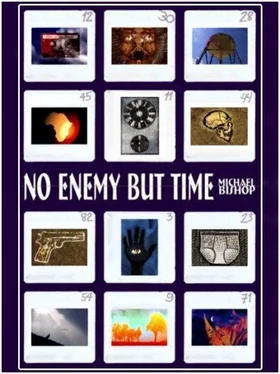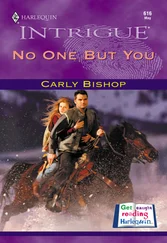For a brief moment, in the black mirror of the water, the child’s mother saw her own unsmiling face. She resembled, even to herself, the bewildered representative of some lost tribe of humanity: sloe-black eyes, a sensuous mouth, and eyebrows growing together above her broad pug nose. In the shadowy water under her hands her swarthiness was emphasized by an even deeper shadow. Many Spaniards considered her a Negro. She shattered her image with a handful of cheap detergent and the limp bludgeon of a diaper.
“Instead, Señorita Ocampo, you are fattening this baby for someone else’s feast. You have deprived him of both baptism and the comfort of human speech, and, should you die, no one will stoop to help him.
Never mind that he scrambles about your apartment like a Barbary ape. Outside, he will not be able to fend for himself—for at present he is only his selfish mother’s juguete , a plaything. If you were to suffer a fatal accident or sicken unto death, he too would be doomed. It is wicked of you not to have thought of this.”
At the conclusion of this part of the old woman’s argument, the child hooted spontaneously and ambled to the railing overlooking the inner courtyard. Encarnación, not seeing him behind her, interrupted her washing to fetch the boy back. To reach him she had to bump the old woman aside, but the contact was less peremptory than she would have liked it to be. This persistent meddling in her affairs was insupportable. It sapped her of energy and self-esteem.
“What of the little one’s father? If he knew you had borne him a child, he would surely wish to rescue it from the folly of such an upbringing. A black man sired this one on you—anyone can see that—but even black men have tongues with which to speak their preferences. You should tell him he has a son.”
Encarnación returned to the wash house. The child, emboldened by his most recent adventure, approached the old woman and gripped her stiff skirts. She, in turn, put the tip of one finger in the center of his woolly head and rubbed it around on that spot as if to ward off any evil implicit in his nearness.
“Cruelty and arrogance,” the crone continued, still rubbing the boy’s head. “It’s pride that makes you take on a responsibility of which you are unworthy. Otherwise you would understand that what you do guarantees the ruin—yes, the damnation—of your brujaco . Time will undo both your pride and your son. And the shameful occupations you pursue—listen, Señorita, they will kill you before you think.”
Her hands and arms dripping, Encarnación whirled about and broke her child’s grip on the old woman’s skirts. The vieja blinked but did not draw back. Although cadaverously skinny, she towered over the young woman, and her height advantage perhaps made her foolhardy. In a moment her mouth was working again, spilling out recriminations, advice, and ominous prophecies.
Encarnación, casting about for an ally, spotted the tin can into which her tormentor had recently emptied her bladder. This she snatched up. Then, shaking the can from side to side before the old woman’s astonished face, she circled her prey to cut off her escape down the interior stairs. The crone gasped, covered her eyes with her forearm, and darted beneath a wire supporting the threadbare burden of her family’s wash.
“ Tenga merced, ” she cried, ducking beneath a pair of trousers. “Have mercy, Señorita.”
The child, hooting, pivoted to keep the action in view. He had forgotten the pigeons, if only for this moment.
The chase continued, and Encarnación permitted the old woman to sweep back beneath the clotheslines and to reach the stairwell. The crone was turning the corner on the first lower landing when Encarnación, upending the can, scored a warm, liquid bull’s-eye on the retreating figure’s head and shoulders.
Screaming and gibbering, her piety altogether flushed from her system, the vieja disappeared into the bowels of the building. Her cries echoed clamorously in the tiled enclosure.
An Ecology of Mirage
Birds, wheeling birds.
From the western edge of Lake Kiboko, in the lee of the ramparts on that side of the Rift, there lifted a glittering cloud of birds. Cormorants maybe, or kingfishers. They were too far away to identify easily (even with my combination reduced-print Bible and field guide), but in spite of the distance I believed that they were reacting to my presence in their world. Their appearance above the lake legitimized my arrival.
In fact, it seemed to me that I had somehow summoned these birds into existence.
The past was awakening.
Once, long ago, in another past, my first awakening to my “talent” as a spirit-traveler sprang from a vision of pigeons flying above the rooftops of an ancient city. Birds on the wing invariably provoke this early memory in me, as a taste of madeleine soaked in a decoction of lime flowers always brought to Proust a vivid recollection of his childhood village. A paradox. Nearly two million years before my birth I had been recalling my infancy….
* * *
Suddenly the lakescape was alive.
Not forty feet away, a crocodile—a moment ago merely a ridge of pebbly earth beside the lake—slithered into the water. Beyond the crocodile, a family of hippopotami, submerged almost to their nostrils, were taking their ease in the weed-grown shallows. These animals were members of the extinct species H. gorgops , immediately recognizable by their periscopic eyes…. Ah, but language plays tricks on me. How could they be extinct when I saw them snorting and yawning like living engines? I, not this family of riverhorses, was the anachronism here.
Never one to surrender without a fight to the fallibility of tomorrow’s technology, I took out my transcordion and keyed in this message: “ I’m home, Dr. Kaprow. This is the destination foretold for me in thousands upon thousands of spirit-traveling episodes. It’s inhabited, this place, and I’m one of the inhabitants. ”
Then I typed, “ Wow. ” And waited for a response that never came. And put the transcordion back in my pocket.
Well to the south, a small herd of rather shaggy antelopes—they looked overdressed for this latitude—was tentatively approaching the lake. I thumbed past Revelation all the way to Ungulates and confirmed that they were either waterbucks ( Kobus ellipsiprymnus ) or their Early Pleistocene equivalents. A solitary bull with a pair of impressive ringed horns led his harem down to the beach, and even though I had assumed the water to be too brackish for drinking, the cows and several yearlings spread out along the shore and nervously lowered their muzzles.
Overhead, a flight of flamingoes on their way to another Rift Valley lake or maybe another part of this one. They were rose-pink against the lightening sky, gangly and graceful at the same time.
Returning my attention to the waterbucks, I was stunned by the quickness with which death struck a calf that had ventured too far out. A crocodile—maybe even the one I had just seen slither off the beach—lunged from submarine concealment and seized the hapless calf by the throat. As the surviving waterbucks bolted in terror for open country, the croc’s viselike jaws dragged the calf into deeper water.
Crimson began to marble the turquoise surface of the lake, and although the family of hippos bathing just west of me remained blithely indifferent to the slaughter, I had to turn aside. My survival training with Babington should have inured me to such sights, but until now I had not really believed that the matter-of-fact savagery of African bionomics would prevail in my objectified dream world. I had been wrong, of course, and the rapacity of the crocodile was not only the young waterbuck’s comeuppance but mine as well.
Читать дальше



![Ally Carter - [Gallagher Girls 01] I'd Tell You I Love You But Then I'd Have to Kill You](/books/262179/ally-carter-gallagher-girls-01-i-d-tell-you-i-lo-thumb.webp)








